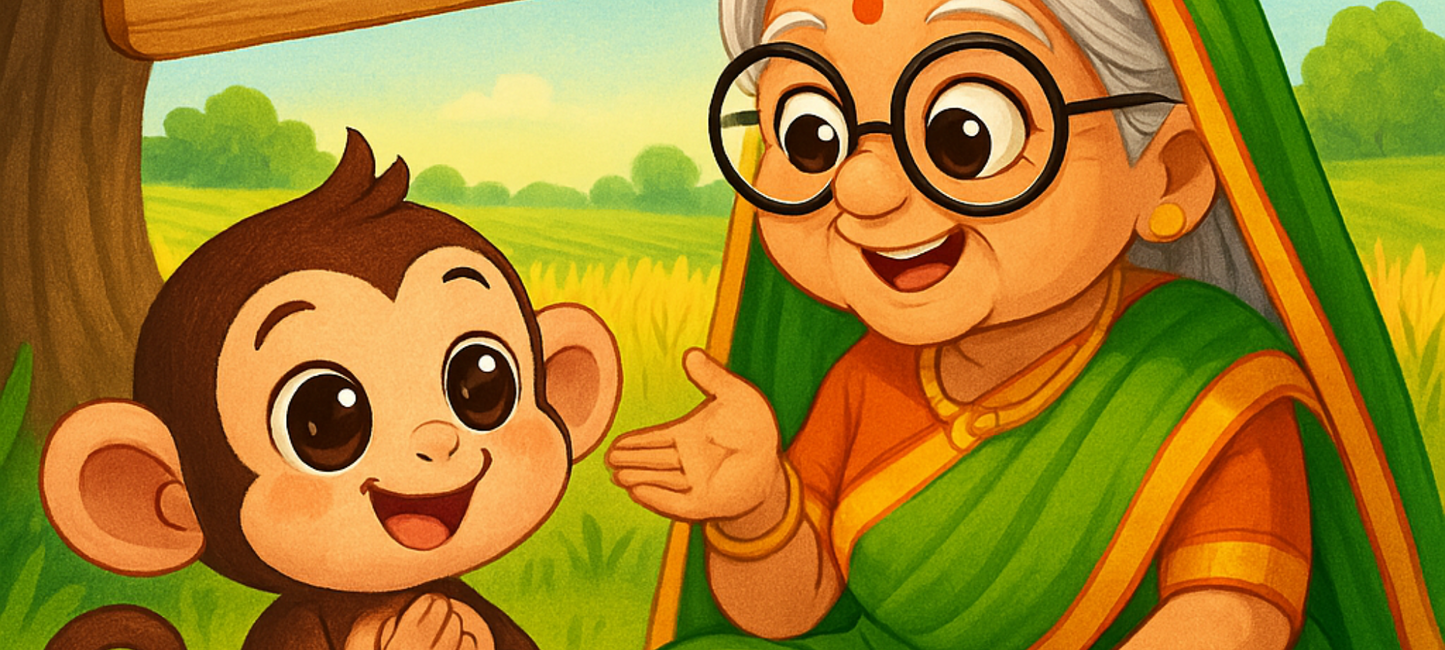
Lil Poco & Granny and Tales of Baishaki
5 Min Read
PART 1: Poila Boishakh – A New Year Full of Magic (and Mishti!)
“Grannyyyy! Why does the house smell like heaven and look like a fairy tale?”
Lil Poco the monkey spun around, watching Granny hang an alpana on the floor and light an earthen lamp.
Granny laughed, “Because today is Poila Boishakh, our Bengali New Year, Poco!”
“Wait… so it’s like 1st January for Bengal?” Poco asked, scratching his head.
“Not exactly,” said Granny, wiping her hands. “Poila Boishakh means the first day of the month of Boishakh in the Bengali calendar. And do you know why it’s celebrated?”
“Tell me, tell me!” Poco chirped.

Granny sat him down and began the story.
“A long time ago, during the Mughal empire, there was an emperor named Akbar. Farmers in Bengal had a big problem. They had to pay taxes all year round—even before harvesting their crops!”
“Rude!” Poco declared.
“Exactly. So Akbar and his wise court astrologer made a new calendar—the Bangabda calendar—to match the harvest cycle. This way, farmers could pay tax after their crops were sold, during a happy time.”
Poco clapped. “That’s smart!”

“It was. And that’s why we still celebrate Poila Boishakh as the start of a prosperous year—after the harvest is done, when granaries are full, and hearts are fuller.”
🪔 Here’s what we do on Poila Boishakh:
-
🌼 Decorate our homes with alpona (beautiful floor art)
-
👗 Wear new clothes—preferably red and white
-
📖 Open Hal Khata—new account books, especially in shops and businesses
-
🛐 Visit temples for prayers and blessings
-
🍚 Cook yummy things like panta bhaat, ilish maachh, luchi-aloor dom, and of course, mishti doi and sondesh!
-
🎉 And we say, Shubho Noboborsho! (Happy New Year!)
“But it’s not just about food,” Granny added with a wink. “It’s about starting fresh. Letting go of last year’s worries. And stepping into the new year with hope, joy and kindness.”
Poco’s eyes twinkled. “It’s like nature’s reset button!”
Granny nodded. “Yes, my little wise monkey. And that’s why Poila Boishakh is so dear to our hearts.”
Just then, the payesh started bubbling in the kitchen.
“Smells like happiness,” Poco whispered.
🛕 PART 2: Baisakhi – The Birth of a Brave Nation

Granny sat Poco down and spoke softly:
“Let me tell you a story from 1699, in a place called Anandpur Sahib. Thousands had gathered to listen to their Guru—Gobind Rai.”
Poco’s tail twitched with excitement. “What did he say?!”
“He asked for something shocking. A human sacrifice. And out of that crowd, five men stood up—one by one. Brave souls from all corners of India.”
-
Daya Ram, a shopkeeper from Lahore
-
Dharam Das, a farmer from Meerut
-
Himmat Rai, a water-carrier from Odisha
-
Mokam Chand, a tailor from Gujarat
-
Sahib Chand, a barber from Karnataka
“These five came from different castes, different lives—but Guru Gobind Rai brought them together and created something powerful. A Khalsa—a brotherhood of strength, purity, and fearlessness. No caste. No division. One India.”

Poco whispered, “Like real-life Avengers… but for justice?”
Granny smiled. “Yes. And they stood up to Mughal and Afghan invaders. They showed how courage and unity could build a Nation.”
✨ PART 3: The Lesson Behind the Celebrations
Poco looked up, curious again. “So… Baisakhi isn’t just about Bhangra and dhol?”

“No, my dear,” Granny said. “Baisakhi is about vision. About imagining a united India—back when India wasn’t even one country yet. Guru Gobind Singh Ji dreamt of a caste-less, fearless nation where everyone was equal.”
“He wasn’t just starting a religion—he was building an idea. And that idea is still alive if we choose to live it.”
Poco smiled and hugged Granny. “Then let’s celebrate both, Granny. With sweets and bravery.”
Granny chuckled, “That’s the spirit, my little Khalsa.”

For more such reads, visit www.pocomico.com!



